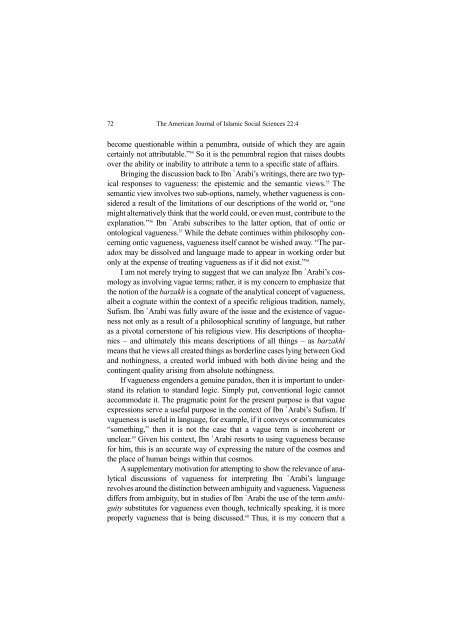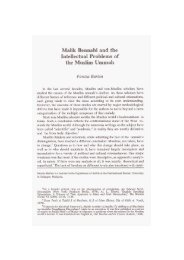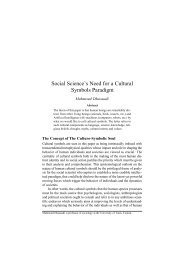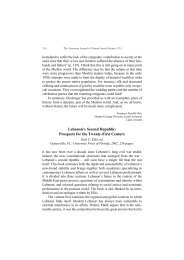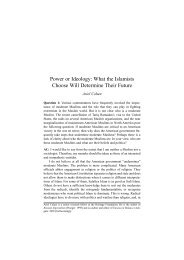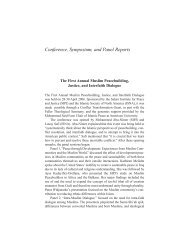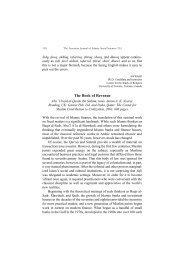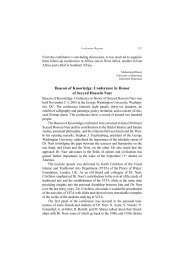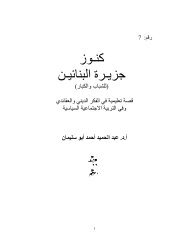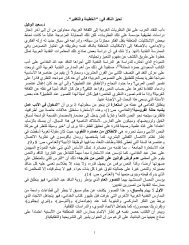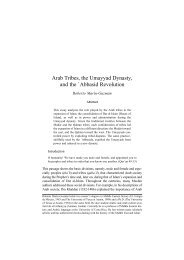Vagueness: An Additional Nuance in the ... - I-Epistemology
Vagueness: An Additional Nuance in the ... - I-Epistemology
Vagueness: An Additional Nuance in the ... - I-Epistemology
You also want an ePaper? Increase the reach of your titles
YUMPU automatically turns print PDFs into web optimized ePapers that Google loves.
72 The American Journal of Islamic Social Sciences 22:4<br />
become questionable with<strong>in</strong> a penumbra, outside of which <strong>the</strong>y are aga<strong>in</strong><br />
certa<strong>in</strong>ly not attributable.” 54 So it is <strong>the</strong> penumbral region that raises doubts<br />
over <strong>the</strong> ability or <strong>in</strong>ability to attribute a term to a specific state of affairs.<br />
Br<strong>in</strong>g<strong>in</strong>g <strong>the</strong> discussion back to Ibn `Arabi’s writ<strong>in</strong>gs, <strong>the</strong>re are two typical<br />
responses to vagueness: <strong>the</strong> epistemic and <strong>the</strong> semantic views. 55 The<br />
semantic view <strong>in</strong>volves two sub-options, namely, whe<strong>the</strong>r vagueness is considered<br />
a result of <strong>the</strong> limitations of our descriptions of <strong>the</strong> world or, “one<br />
might alternatively th<strong>in</strong>k that <strong>the</strong> world could, or even must, contribute to <strong>the</strong><br />
explanation.” 56 Ibn `Arabi subscribes to <strong>the</strong> latter option, that of ontic or<br />
ontological vagueness. 57 While <strong>the</strong> debate cont<strong>in</strong>ues with<strong>in</strong> philosophy concern<strong>in</strong>g<br />
ontic vagueness, vagueness itself cannot be wished away. “The paradox<br />
may be dissolved and language made to appear <strong>in</strong> work<strong>in</strong>g order but<br />
only at <strong>the</strong> expense of treat<strong>in</strong>g vagueness as if it did not exist.” 58<br />
I am not merely try<strong>in</strong>g to suggest that we can analyze Ibn `Arabi’s cosmology<br />
as <strong>in</strong>volv<strong>in</strong>g vague terms; ra<strong>the</strong>r, it is my concern to emphasize that<br />
<strong>the</strong> notion of <strong>the</strong> barzakh is a cognate of <strong>the</strong> analytical concept of vagueness,<br />
albeit a cognate with<strong>in</strong> <strong>the</strong> context of a specific religious tradition, namely,<br />
Sufism. Ibn `Arabi was fully aware of <strong>the</strong> issue and <strong>the</strong> existence of vagueness<br />
not only as a result of a philosophical scrut<strong>in</strong>y of language, but ra<strong>the</strong>r<br />
as a pivotal cornerstone of his religious view. His descriptions of <strong>the</strong>ophanies<br />
– and ultimately this means descriptions of all th<strong>in</strong>gs – as barzakhi<br />
means that he views all created th<strong>in</strong>gs as borderl<strong>in</strong>e cases ly<strong>in</strong>g between God<br />
and noth<strong>in</strong>gness, a created world imbued with both div<strong>in</strong>e be<strong>in</strong>g and <strong>the</strong><br />
cont<strong>in</strong>gent quality aris<strong>in</strong>g from absolute noth<strong>in</strong>gness.<br />
If vagueness engenders a genu<strong>in</strong>e paradox, <strong>the</strong>n it is important to understand<br />
its relation to standard logic. Simply put, conventional logic cannot<br />
accommodate it. The pragmatic po<strong>in</strong>t for <strong>the</strong> present purpose is that vague<br />
expressions serve a useful purpose <strong>in</strong> <strong>the</strong> context of Ibn `Arabi’s Sufism. If<br />
vagueness is useful <strong>in</strong> language, for example, if it conveys or communicates<br />
“someth<strong>in</strong>g,” <strong>the</strong>n it is not <strong>the</strong> case that a vague term is <strong>in</strong>coherent or<br />
unclear. 59 Given his context, Ibn `Arabi resorts to us<strong>in</strong>g vagueness because<br />
for him, this is an accurate way of express<strong>in</strong>g <strong>the</strong> nature of <strong>the</strong> cosmos and<br />
<strong>the</strong> place of human be<strong>in</strong>gs with<strong>in</strong> that cosmos.<br />
A supplementary motivation for attempt<strong>in</strong>g to show <strong>the</strong> relevance of analytical<br />
discussions of vagueness for <strong>in</strong>terpret<strong>in</strong>g Ibn `Arabi’s language<br />
revolves around <strong>the</strong> dist<strong>in</strong>ction between ambiguity and vagueness. <strong>Vagueness</strong><br />
differs from ambiguity, but <strong>in</strong> studies of Ibn `Arabi <strong>the</strong> use of <strong>the</strong> term ambiguity<br />
substitutes for vagueness even though, technically speak<strong>in</strong>g, it is more<br />
properly vagueness that is be<strong>in</strong>g discussed. 60 Thus, it is my concern that a


